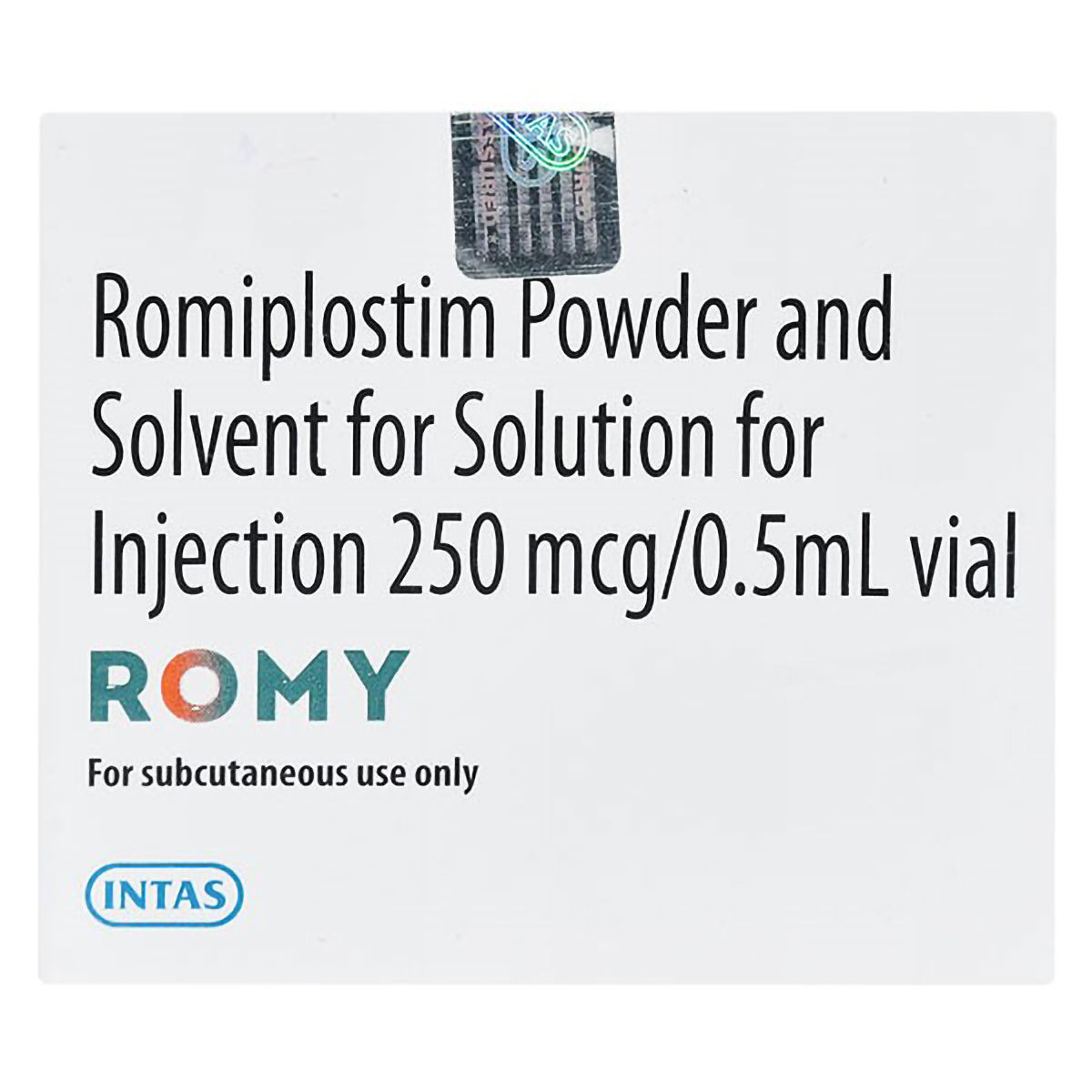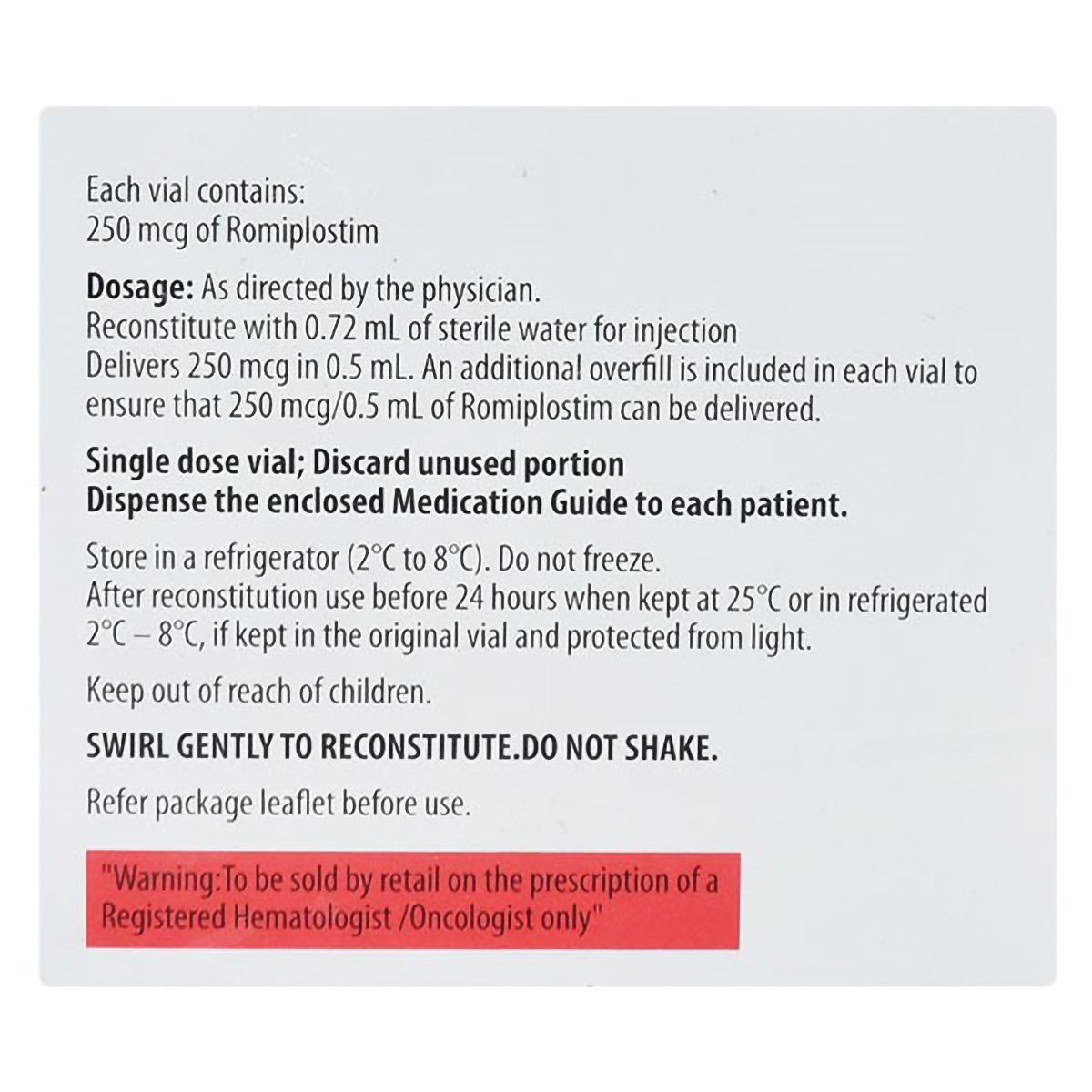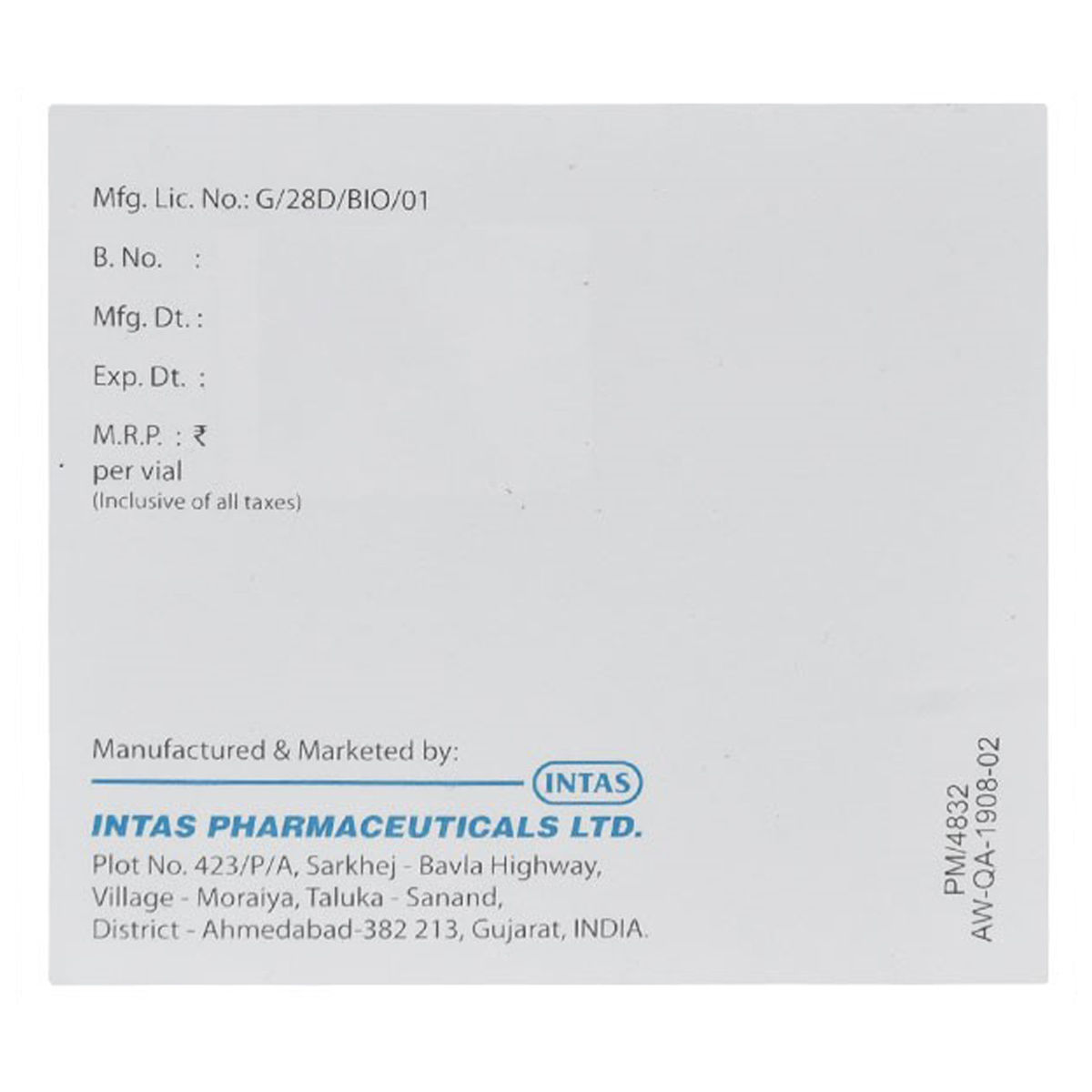Romy Injection 0.5 ml



₹3586.5*
MRP ₹3985
10% off
₹3586.5*
MRP ₹3985
10% CB
₹398.5 cashback(10%)
Free Delivery
With Circle membership
(Inclusive of all Taxes)
This offer price is valid on orders above ₹800. Apply coupon PHARMA10/PHARMA18 (excluding restricted items)
Know Your Delivery Time
Provide Delivery Location
Available Offers
 Prescription drug
Prescription drugWhats That

Secure Payment

India's Most Trusted Pharmacy

Genuine Products
Composition :
Manufacturer/Marketer :
Consume Type :
Return Policy :
Expires on or after :
About Romy Injection
Romy Injection belongs to the class of 'platelet-stimulating agents' primarily used to treat chronic immune thrombocytopenia in adults who have had an insufficient response to corticosteroids, immunoglobulins, or splenectomy. Immune thrombocytopenia, often called idiopathic thrombocytopenic purpura (ITP), is an immune disorder characterised by low platelet counts.
Romy Injection contains 'Romiplostim,' which is a thrombopoietin receptor agonist that functions similarly to thrombopoietin. Romy Injection promotes platelet formation by activating the thrombopoietin receptor. Thereby, Romy Injection helps treat immune thrombocytopenia effectively.
Romy Injection will be administered by the healthcare professional. In some cases, Romy Injection may cause common side effects like headache, joint pain, dizziness, trouble sleeping, muscle tenderness or weakness, pain in the arms and legs and indigestion. These side effects may vary individually. Most of these side effects do not require medical attention and will resolve gradually over time. However, you are advised to talk to your doctor if you experience these side effects persistently.
Notify your doctor if you have allergic reactions to Romy Injection or other medications. You must inform your doctor if you have leukaemia (blood or bone marrow cancer), bleeding or clotting disorders, or heart, kidney, or liver problems. Romy Injection is not recommended during pregnancy unless indicated by the doctor. Romy Injection may make you dizzy; hence drive or operate machinery only when you are alert. Romy Injection is not recommended for use during breastfeeding.
Uses of Romy Injection
Directions for Use
Medicinal Benefits
Romy Injection contains 'Romiplostim' which belongs to the class of 'thrombopoietin receptor agonists' used to treat low blood platelet count in patients with immune thrombocytopenia. Romy Injection promotes platelet formation by activating the thrombopoietin receptor. Thereby, Romy Injection helps treat immune thrombocytopenia effectively.
How Romy Injection Works
Storage
- Please inform your doctor about joint pain symptoms, as they may adjust your medication regimen or prescribe additional medications to manage symptoms.
- Your doctor may prescribe common pain relievers if necessary to treat joint discomfort.
- Maintaining a healthy lifestyle is key to relieving joint discomfort. Regular exercise, such as low-impact sports like walking, cycling, or swimming, should be combined with a well-balanced diet. Aim for 7-8 hours of sleep per night to assist your body in repairing and rebuilding tissue.
- Applying heat or cold packs to the affected joint can help reduce pain and inflammation.
- Please track when joint pain occurs and any factors that may trigger it, and share this information with your doctor to help manage symptoms.
- If your joint pain is severe or prolonged, consult a doctor to rule out any underlying disorders that may require treatment.
- Eat fatty fish rich in omega-3 fatty acids to reduce inflammation.
- Add whole grains such as brown rice, quinoa, and whole wheat bread to your diet for a nutritional boost.
- Add nuts and seeds like almonds, walnuts, chia seeds for anti-inflammatory benefits.
- Eat dark leafy greens like spinach, kale, collard greens for antioxidants.
- Include berries like blueberries, strawberries, raspberries for anti-inflammatory properties.
- Rest and take a break from usual activities.
- Apply ice for 15-20 minutes, 3 times a day to reduce pain and inflammation.
- Use compression with a stretchable bandage or wrap to lessen swelling and provide support.
- Avoid strenuous activities and rest the affected area.
- Try light stretching with gentle exercises to maintain flexibility.
- Consider OTC pain medications like ibuprofen or acetaminophen but consult a doctor before taking any medication.
- Report to Your Doctor: Inform your doctor about the muscle pain, as they may need to adjust your medication.
- Stretch Regularly: Gentle stretching can help relieve muscle pain and stiffness.
- Stay Hydrated: Adequate water intake supports muscle health by removing harmful substances and maintaining proper muscle function.
- Warm or Cold Compresses: Apply cold or warm compresses to the affected area to reduce pain and inflammation.
- Rest and Relaxation: Adequate rest helps alleviate muscle strain, while relaxation techniques like deep breathing and meditation can soothe muscle tightness, calm the mind, and promote relief from discomfort.
- Gentle Exercise: Participate in low-impact activities, such as yoga or short walks, to improve flexibility, reduce muscle tension, and alleviate discomfort.
- Consult a physician: If your symptoms don't improve or get worse, go to the doctor for help and guidance.
- Inform your doctor about dizziness symptoms. They may adjust your medication regimen or prescribe additional medications to manage symptoms.
- Follow your doctor's instructions for taking medication, and take it at the same time every day to minimize dizziness.
- When standing up, do so slowly and carefully to avoid sudden dizziness.
- Avoid making sudden movements, such as turning or bending quickly, which can exacerbate dizziness.
- Drink plenty of water throughout the day to stay hydrated and help alleviate dizziness symptoms.
- If you're feeling dizzy, sit or lie down and rest until the dizziness passes.
- Track when dizziness occurs and any factors that may trigger it, and share this information with your doctor to help manage symptoms.
- Prepare for a restful night's sleep: Develop a calming pre-sleep routine, like reading or meditation, to help your body relax and prepare for sleep.
- Create a sleep-conducive Environment: Make bedroom a sleep haven by ensuring it is quiet, dark and calm.
- Follow a Sleep Schedule: Go to bed and get up at the same time every day to help regulate your body's internal clock and increase sleep quality.
- Try relaxing techniques like deep breathing, mindfulness meditation and any others.
- Limit stimulating activities before bedtime: Avoid stimulating activities before bedtime to improve sleep quality.
- Monitor Progress: Keep track of your sleep patterns to identify areas for improvement.
- Consult a doctor if needed: If these steps don't improve your sleep, consult a doctor for further guidance and therapy.
- Managing a low platelet count (thrombocytopenia) caused by medication usage requires a multi-step approach. Here are some steps to help manage the condition:
- Inform your doctor about your low platelet count and medication usage. They will assess the situation and guide the best course of action.
- Your doctor may recommend adjusting or stopping the medication that is causing a low platelet count. This could involve switching to alternative medication or reducing the dosage.
- Monitor your platelet count regularly through blood tests to track any changes. This will help the doctor determine the effectiveness of the treatment plan.
- If an underlying condition, such as infection or inflammation, contributes to the low platelet count, your doctor will treat it.
- In some cases, alternative treatments like platelet transfusions or medications that stimulate platelet production may be necessary.
- Avoid risky activities and certain medications; eat a balanced diet with plenty of water to reduce bleeding risk and boost overall health.
- If you experience severe bleeding or bruising, seek emergency medical attention immediately.
- Eat a balanced diet rich in fruits, vegetables, whole grains, lean protein, and healthy fats.
- Boost fiber, fruits, vegetables, omega-3 fatty acids, and vitamin K-rich foods.
- Limit red meat, processed foods, sugary drinks, and excessive alcohol.
- Exercise regularly with moderate-intensity activities for healthy blood flow.
- Stay hydrated by drinking plenty of water.
- Quit smoking to reduce blood clot risk.
- Practice stress-reducing techniques like yoga or meditation.
- Maintain a healthy weight to lower cardiovascular risk.
- Always seek guidance from a healthcare professional before implementing major changes to your diet or lifestyle.
What if I have taken an overdose of Romy Injection
Drug Warnings
Before beginning Romy Injection , notify your doctor if you have had any allergic reactions to Romy Injection or any other medications. You must notify your doctor if you have blood or bone marrow cancer (leukaemia), bleeding or clotting disorders, heart, kidney, or liver problems. Romy Injection is not recommended during pregnancy unless indicated by the doctor. Romy Injection may make you dizzy hence do not attempt to drive or operate machinery until you are physically stable and mentally alert. Romy Injection should never be used to normalize platelet counts; Romy Injection should only be used in ITP patients whose thrombocytopenia and clinical condition increase the risk of bleeding. Romy Injection is not recommended for use during breastfeeding.
Drug-Drug Interactions
Drug-Drug Interactions
Login/Sign Up
Drug-Food Interactions
Drug-Food Interactions
Login/Sign Up
Diet & Lifestyle Advise
- Eating papaya is the greatest natural therapy for increasing platelet count; you can also use a blend of papaya leaves.
- A high protein diet, which includes lean meat, chicken, crab, turkey, beef, and fish, can help improve platelet count.
- Include iron-rich foods such as pomegranate, beetroot, green leafy vegetables, carrots, raisins, oranges, peanuts, kidney beans, and black-eyed peas.
- Platelet counts can be increased by eating foods high in vitamin C, such as guava, black currant, red pepper, kiwi, green peppers, orange, strawberries, pineapple, peas, mango, grapefruit, and broccoli.
- Exercise on a regular basis to keep your body and mind healthy.
- Smoking and consuming alcohol should be avoided.
- To reduce the risk of bleeding, avoid activities such as contact sports and the use of sharp objects such as nail cutters and razors.
Habit Forming
Therapeutic Class
Romy Injection Substitute

Augplat 250 mcg Injection 1's
by Others
₹3059.40per tabletRomiset 250 mcg Injection 1's
by Others
₹2697.80per tablet
Product Substitutes
Alcohol
Caution
You are recommended not to consume alcohol along with Romy Injection to avoid unpleasant side effects.
Pregnancy
Caution
Romy Injection is not recommended in pregnancy unless indicated by the doctor. Please consult your doctor if you are pregnant or planning to conceive.
Breast Feeding
Unsafe
Breast-feeding must be avoided during treatment with Romy Injection . Please consult your doctor if you have any concerns.
Driving
Caution
Romy Injection may cause dizziness. Hence, it is recommended not to drive or operate machinery until you are mentally alert.
Liver
Caution
Romy Injection is not recommended particularly if you have a history of chronic liver disease/conditions. Please consult your doctor if you have any concerns
Kidney
Caution
Limited information was available for the usage of Romy Injection in patients suffering from kidney illness. Please consult your doctor if you have any concerns. Your doctor will prescribe only if the benefits outweigh the risks.
Children
Caution
Romy Injection is not recommended for children less than one year of age.

Have a query?
FAQs
Romy Injection belongs to the class of 'platelet-stimulating agents' primarily used to treat chronic immune thrombocytopenia in adults who have had an insufficient response to corticosteroids, immunoglobulins, or splenectomy.
Romy Injection contains Romiplostim, which promotes platelet formation by activating the thrombopoietin receptor. Thus Romy Injection lowers the risk of bleeding episodes in diseases like immune thrombocytopenia and other associated conditions.
Immune thrombocytopenia is an autoimmune disorder in which the immune system misidentifies platelets as foreign bodies and destroys them. It can occur due to a virus, vaccination, or certain drugs. But the origin is unknown in the majority of cases.
Romy Injection is only advised for patients who have not responded adequately to other treatments such as corticosteroids, immunoglobulins, or splenectomy.
Idiopathic thrombocytopenic purpura is typically diagnosed with blood tests such as complete blood count and antiplatelet-antibody test.
Romy Injection is not approved to treat thrombocytopenia caused by Myelodysplastic syndrome (MDS) or any other cause of thrombocytopenia apart from chronic ITP.
Country of origin
Manufacturer/Marketer address
Customers Also Bought
Disclaimer
Keep Refrigerated. Do not freeze.Prepaid payment required.
Author Details
We provide you with authentic, trustworthy and relevant information




















